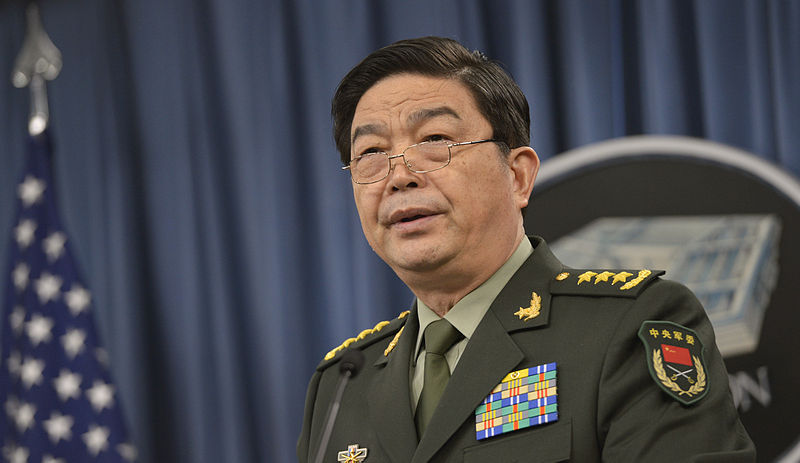
Chinese defence minister visits B'desh to boost ties
Chinese Defence Minister Chang Wanquan has just made a high-profile trip to Bangladesh, accompanied by a 39-member delegation. He met with Prime Minister Sheikh Hasina, President Abdul Hamid and senior defence officials, including the Bangladesh army, navy and air force chiefs.
During his meeting with Prime Minister Hasina, Chang said China wanted to “expand strategic relations with Bangladesh,” including deepening bilateral cooperation and increasing military exchanges and personnel training in new equipment technology.
The May 28–30 visit followed indications that the Bangladesh government might be accommodating to economic and political pressures from India and Japan. Indian Prime Minister Narendra Modi visited Bangladesh last year and signed a number of significant agreements, including a long delayed Land Boundary Agreement demarcating borders and river water sharing between the two countries. Modi also promised to provide $2 billion in loans.
Japanese Prime Minister Shinzo Abe invited Bangladesh Prime minister Hasina to attend last month’s outreach meeting during the G7 Ise-Shima Summit in Japan. Abe promised Hasina that he would release $1.5 billion this year from a $5 billion loan agreed during his visit to Bangladesh in 2014.
China is Bangladesh’s main supplier of military hardware, its largest trading partner and continues to make large investments in the country.
According to the Stockholm International Peace Research Institute, since 2010 Beijing has supplied Dhaka with five maritime patrol vessels, two corvettes, 44 tanks, and 16 fighter jets, as well as surface-to-air and anti-ship missiles. Dhaka has also ordered new Ming-class submarines that will join the Bangladesh fleet later this year.
Hasina told Chang that Bangladesh wanted to strengthen its cooperation with China, especially in the fields of economy, agriculture, and infrastructure. She also said that her government would continue working with Beijing on the Bangladesh, China, India and Myanmar (BCIM) Economic Corridor, which aims to increase trade and economic activity in the region.
China currently has a $705 million contract to build a two-lane under-water tunnel connecting Chittagong port and Karnaphuli River Valley. In early May, the Hasina government approved the $4.47 billion Padma Bridge rail link project. The Asian Infrastructure Investment Bank (AIIB), which was initiated by Beijing, recently granted a $66 million loan for two power distribution projects and the improvement of transmission lines in Bangladesh.
Chinese investors are keen to shift labour-intensive industries, such as garment manufacturing, to Bangladesh in order to exploit its cheap labour. Bangladeshi wages—in manufacturing and non-manufacturing sectors—are less than one-fourth of those in China and half of that in India.
Bangladesh industry has grown rapidly over the past decade but the country does not have a deep-water port.
Recent years has seen intense competition between India, Japan and China for various seaport contracts in the country. A June 7 article in the Diplomat commented that Bangladesh lacked a deep-water seaport “not because of a lack of options, a deficit of investors” but because “many powerful players are pushing for too many contending plans …”
Bangladesh had previously agreed to assign the Sonadia seaport development to China. However, Hasina did not sign the scheduled agreement when she visited Beijing in 2014.
One of the reasons given by the government was that Japan would build a new port in Matabari, a few kilometres away from Sonadia. Beijing said it wanted to develop another port at Payra. Last month Bangladesh, signed a contract with a Dutch company to build the Payra port.
-
CHINA DIGEST
-
 ChinaChina Digest
China’s PMI falls for 3rd month highlighting challenges world’s second biggest economy faces
ChinaChina Digest
China’s PMI falls for 3rd month highlighting challenges world’s second biggest economy faces
-
 ChinaChina Digest
Xi urges Chinese envoys to create ‘diplomatic iron army’
ChinaChina Digest
Xi urges Chinese envoys to create ‘diplomatic iron army’
-
 ChinaChina Digest
What China’s new defense minister tells us about Xi’s military purge
ChinaChina Digest
What China’s new defense minister tells us about Xi’s military purge
-
 ChinaChina Digest
China removes nine PLA generals from top legislature in sign of wider purge
ChinaChina Digest
China removes nine PLA generals from top legislature in sign of wider purge
-
-
SOUTH ASIAN DIGEST
-
 South Asian Digest
Kataragama Kapuwa’s arrest sparks debate of divine offerings in Sri Lanka
South Asian Digest
Kataragama Kapuwa’s arrest sparks debate of divine offerings in Sri Lanka
-
 South Asian Digest
Nepal: Prime Minister Dahal reassures chief ministers on police adjustment, civil service law
South Asian Digest
Nepal: Prime Minister Dahal reassures chief ministers on police adjustment, civil service law
-
 South Asian Digest
Akhund’s visit to Islamabad may ease tensions on TTP issue
South Asian Digest
Akhund’s visit to Islamabad may ease tensions on TTP issue
-
 South Asian Digest
Pakistan: PTI top tier jolted by rejections ahead of polls
South Asian Digest
Pakistan: PTI top tier jolted by rejections ahead of polls
-






Comments